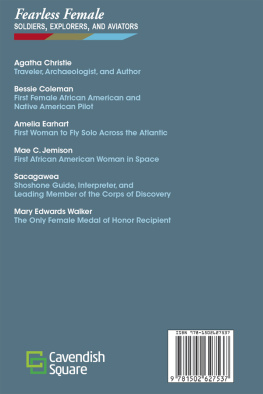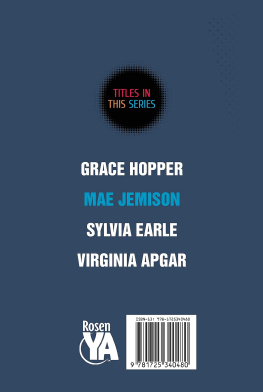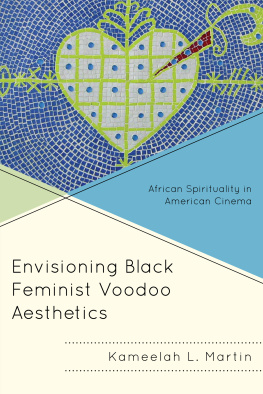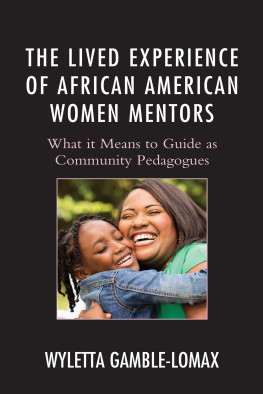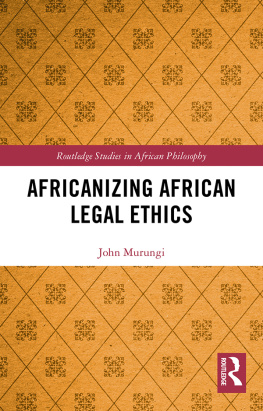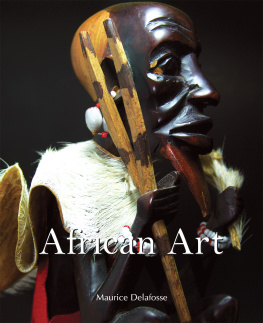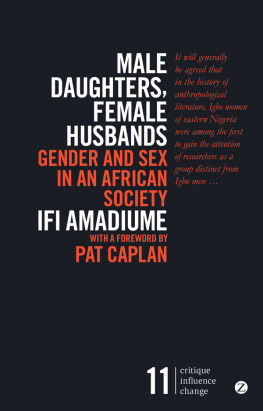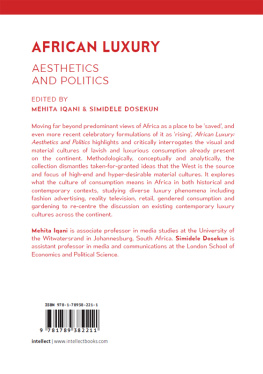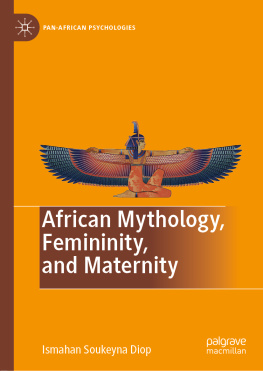Female Monarchs and Merchant Queens in Africa
OHIO SHORT HISTORIES OF AFRICA
This series of Ohio Short Histories of Africa is meant for those who are looking for a brief but lively introduction to a wide range of topics in African history, politics, and biography, written by some of the leading experts in their fields.
Steve Biko
by Lindy Wilson
Spear of the Nation (Umkhonto weSizwe): South Africas Liberation Army, 1960s1990s
by Janet Cherry
Epidemics: The Story of South Africas Five Most Lethal Human Diseases
by Howard Phillips
South Africas Struggle for Human Rights
by Saul Dubow
San Rock Art
by J.D. Lewis-Williams
Ingrid Jonker: Poet under Apartheid
by Louise Viljoen
The ANC Youth League
by Clive Glaser
Govan Mbeki
by Colin Bundy
The Idea of the ANC
by Anthony Butler
Emperor Haile Selassie
by Bereket Habte Selassie
Thomas Sankara: An African Revolutionary
by Ernest Harsch
Patrice Lumumba
by Georges Nzongola-Ntalaja
Short-changed? South Africa since Apartheid
by Colin Bundy
The ANC Womens League: Sex, Gender and Politics
by Shireen Hassim
The Soweto Uprising
by Noor Nieftagodien
Frantz Fanon: Toward a Revolutionary Humanism
by Christopher J. Lee
Ellen Johnson Sirleaf
by Pamela Scully
Ken Saro-Wiwa
by Roy Doron and Toyin Falola
South Sudan: A New History for a New Nation
by Douglas H. Johnson
Julius Nyerere
by Paul Bjerk
Thabo Mbeki
by Adekeye Adebajo
Robert Mugabe
by Sue Onslow and Martin Plaut
Albert Luthuli
by Robert Trent Vinson
Boko Haram
by Brandon Kendhammer and Carmen McCain
A Short History of Chinua Achebes Things Fall Apart
by Terri Ochiagha
Amlcar Cabral
by Peter Karibe Mendy
Wangari Maathai
by Tabitha Kanogo
Josie Mpama/Palmer: Get Up and Get Moving
by Robert R. Edgar
Female Monarchs and Merchant Queens in Africa
by Nwando Achebe
Female Monarchs and Merchant Queens in Africa
Nwando Achebe
OHIO UNIVERSITY PRESS
ATHENS
Ohio University Press, Athens, Ohio 45701
ohioswallow.com
2020 by Ohio University Press
All rights reserved
To obtain permission to quote, reprint, or otherwise reproduce or distribute material from Ohio University Press publications, please contact our rights and permissions department at (740) 593-1154 or (740) 593-4536 (fax).
Printed in the United States of America
Ohio University Press books are printed on acid-free paper 
30 29 28 27 26 25 24 23 22 21 20 5 4 3 2 1
Front cover art and design by Adonis Durado.
www.adonisdurado.com
Library of Congress Cataloging-in-Publication Data
Names: Achebe, Nwando, 1970- author.
Title: Female monarchs and merchant queens in Africa / Nwando Achebe.
Other titles: Ohio short histories of Africa.
Description: Athens, Ohio : Ohio University Press, 2020. | Series: Ohio short histories of Africa | Includes bibliographical references and index.
Identifiers: LCCN 2020002540 | ISBN 9780821424070 (paperback) | ISBN 9780821440803 (pdf)
Subjects: LCSH: Women--Africa--Social conditions. | Women heads of state--Africa. | Queens--Africa. | Women civic leaders--Africa. | Goddesses, African. | Power (Social sciences)--Africa.
Classification: LCC HQ1787 .A247 2020 | DDC 305.42096--dc23
LC record available at https://lccn.loc.gov/2020002540
To my husband, Folu Ogundimu, For your unconditional love, support, and friendship, This book is affectionately dedicated to you
Contents
Illustrations
Preface
Until Lions Have Their Own Historians, the Story of the Hunt Will Always Glorify the HunterAfricanizing History, Feminizing Knowledge
Whose histories, whose stories, whose archives? Almost six decades ago, Africanist historian Terence Ranger pondered the question of to what degree African history was actually truly African, and whether the methods and concerns derived from Western historiography were in fact sufficient tools for researching and narrating African history. This issue remains a foremost concern of many African-born researchers such as myself, who continue to question the manner in which African worlds have historically and contemporarily been (re)constructed.
We are cognizant of the fact that Africa was the site of some of the worst external abuses, a reality which resulted in a production of knowledge that has almost exclusively been shaped by these influences. We also share concerns regarding the ability of Africans to tell their own stories, on their own terms, free from Eurocentric biases. We are especially concerned about this because the inconceivable and arbitrary violence born out of slavery and colonial discourse has produced an African canon that is as dehumanizing and silencing as brute force.
From Muslim traders and travelers of the seventh to fifteenth centuries documenting African worlds in their travel logs to the accounts of European and Arab slavers, travelers, missionaries, and colonialists writing African worlds during the age of exploration, international slave trades, and conquest, these narratives have survived in what the eighth king of Dahomey, King Agonglo, described in 1793 as books that never die, chronicling historical perspectives that were variously skewed, incomplete, and/or ethnocentric in their leanings. It is these narratives that have propelled the very nature of Africanist scholarship in the present day. Again, I ask, whose stories, whose histories, whose archives?
Given this historical reality, I have responded to the challenge of Africanizing and feminizing knowledge by attempting to restore voice and dignity to a people beset with memories of having been reduced to objects by slavers and colonial oppressors. I have done this by (re)framing and (re)telling the African gendered narrative in solidly African-centered and gendered terms. The end result is a body of scholarshipsix monographs and a slew of journal articles and book chaptersthat is unapologetically African-centered.
I have not rested easy with simply writing back at the received African canon. I have also, for the past twenty-five years, dedicated my career to honing my teaching of African history in the US college classroom. At Michigan State University, I have developed and taught several award-winning undergraduate-level courses on Africa, courses in which I have disseminated African-centered knowledge about Africa to thousands of young and inquiring minds.
In this context, I see myself as a missionary in reverse: one whose job it is to teach African worlds on their own terms; a person whose job it is to teach Africa in ways that Africans themselves conceptualize their histories and their worlds. And the end result of this pedagogical odyssey are histories that do not always neatly fit into Western-defined models of historical writing, understanding, and interpretation. Take for instance the fact that Africans do not necessarily conceptualize their histories in exclusively linear and strictly chronological terms. The proof of this can be found when a researcher approaches a living African archive, an African elder, with the following clear-sighted questions: What year did a particular event occur? or How old are you? These questions may seem simple and straightforward, and thus could be expected to elicit simple and straightforward answers. But, no sooner does the elder respond that he or she does not know what year the incident happenedor, worse still, shares with said researcher that he or she is about one hundred and fifty years oldthan said researcher realizes that he or she has not asked the right questions. The right questions, the African-informed questions, should not be In what year did a particular event occur? or How old are you? They instead should be framed to discern what might have been happening historically around the time of the event or the elders birth. Questions such as these would be sure to elicit more precise answers, answers such as the following: The event occurred when daytime became nighttime (read: during the coming of the locusts); or I was born during the time of the great destroyer (read: during the Great Influenza). Again, I ask, whose questions? Whose archives? Whose answers? For informed inquiry elicits informed answers and interpretations.
Next page

